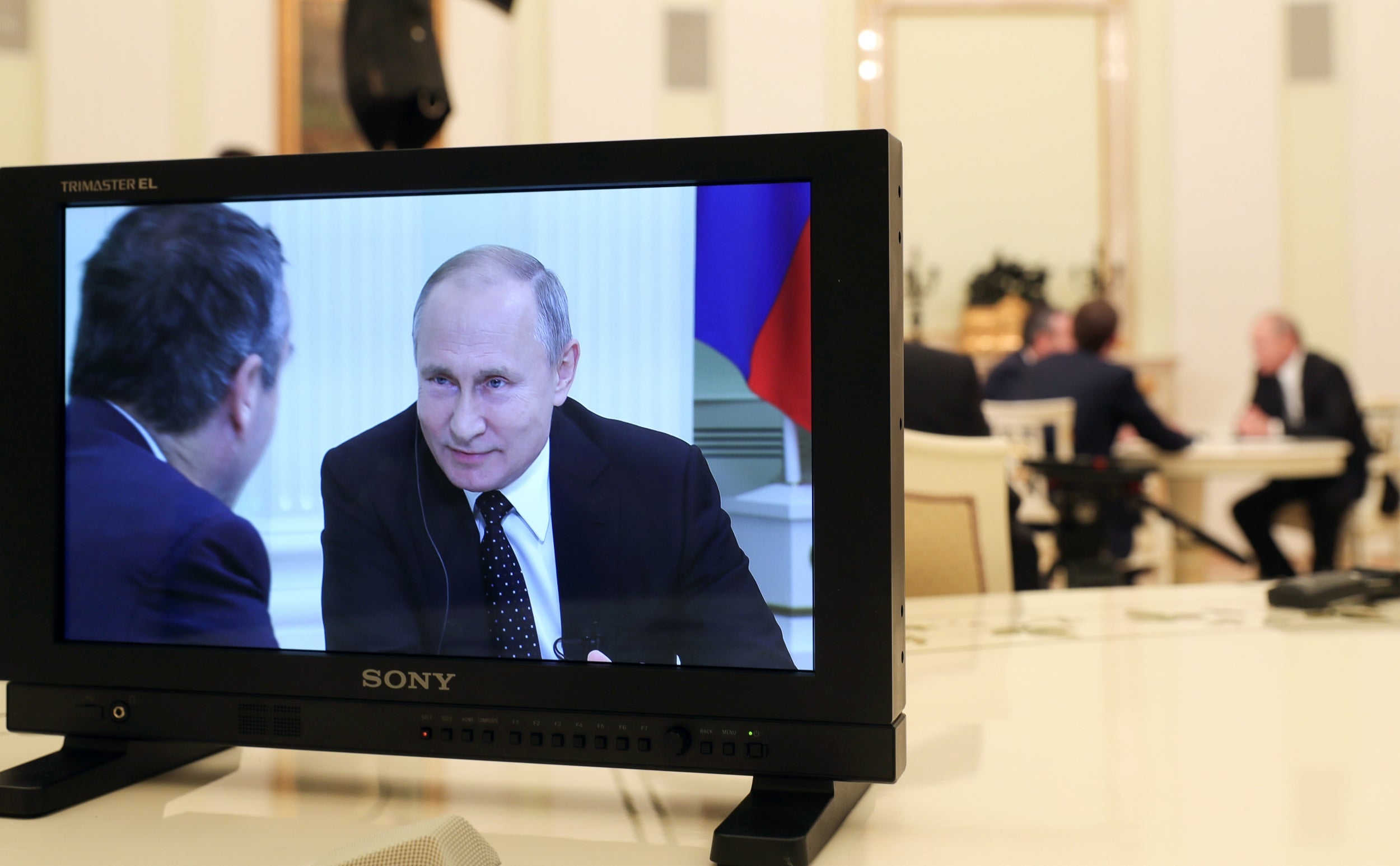Kremlin insists Putin hasn’t given up on liberalism, but was it ever really there?
Analysis: The influence of the Russian president is such that any ideological shift makes international waves

Getting into one man’s mind is a generally pointless task. But when it comes to Vladimir Putin, a leader who has concentrated power so much that his personal disposition easily becomes international interest, it is a fascination that has resulted in hundreds of thousands of books and articles.
And when the Russian president gives a rare interview to declare the end of the liberal idea — in his own mind and in the West — it naturally becomes a talking point.
For those following Kremlin politics, the revelation the former KGB agent is no disciple of John Locke should come as no real surprise. In the two decades of his rule, his regime has re-asserted control of practically all areas of Russian life: from sex to religion, education and art.
But formally at least — and as recently as 2014 — Mr Putin has identified himself as “a liberal” and “aligned to the liberal idea.” In 2016, his press secretary Dmitry Peskov went further, describing him to be “an absolute liberal” and “much more of a liberal than… the opposition.”
Just a few hours after the interview in the Financial Times, Mr Peskov briefed journalists that Mr Putin had not, in fact, entirely given up on the liberal idea. He was a nearly-liberal, a man “close to the ideas of liberalism.” The Russian president was simply speaking out against the idea of “imposing the unconventional … regardless of cultural, religious or other factors.”
So where is the truth? Is Vladimir Putin a liberal? Has he ever been a liberal?
Kim-Putin summit: Leaders meet for first talks in Russia
Show all 10Whether Mr Putin is driven by any kind of ideology has been a point of contention for a while.
On the one hand, the Russian leader’s tactical dexterity — allying with America post 9/11 then falling out; falling out with Turkey and then allying with Turkey; turning national-patriotic switches off, then on and now, perhaps, half off again — has been interpreted as a sign of political pragmatism, rather than any guiding ideology.
There is some merit in interpreting the attack on Western liberalism thus: as an opportunistic appropriation of alt-right ideology (gays and migrants) to undermine a European continent already in disarray.
But the notion that Mr Putin is detached from ideology does not feel entirely correct. His ideology might not be a doctrine like Communism once was, but it certainly looks socially conservative from most vantage points. It's a world view that became most obvious in the clampdown following mass protests of 2011-12, though the roots go back further.
“You can debate as to whether Putin was an economic liberal before the protests, but socially there has been little change,” the independent analyst and author Masha Lipman told The Independent.
“The ideas of an interfering, big state were there in his first manifesto in 2000. And as far as liberalism means a focus on liberties and human rights, Putin has been anything but liberal.”
Tatyana Stanovaya, CEO of the political analysis firm R.Politik, and another experienced Kremlin watcher, also rejected the idea that Mr Putin’s attack on liberalism was opportunistic. Putin’s embraace of a harsher ideology was authentic, she said, and had evolved over his 19 years in power.
"Putin believes liberalism means a naive inability to accept the occasional excess," she said. "He believes you can't make an omelette without breaking eggs."
The ideology is most obvious in Russia's domestic policy. Early on in Mr Putin’s reign, aides like Vladislav Surkov tried to co-opt and negotiate with the opposition. Now it has become a matter of managing arrests and crackdowns, and making any public manifestation of dissent dangerous.
“Putin has exhausted the liberal idea within himself and replaced it with the ideas of order and internal structure,” she said. “In this sense, the Peskov intervention was like artificial life-support, trying to reanimate a body that has already lost all consciousness.”
The insistence by Mr Putin’s team that he had not completely given up on the liberal idea was most likely "an attempt to reduce ill-will in Europe" at a time that Russia needed to be building bridges.
The Russian president likely also had Europe in mind when he made the comments. He has not forgotten his exclusion from the top table following the annexation of Crimea in 2014, and the remarks of German Chancellor Angela Merkel that year, when she said he was "living in another world."
"This was his response," said Ms Lipman. "He wanted to tell the world that he'd won, that they were living in his world now"
Subscribe to Independent Premium to bookmark this article
Want to bookmark your favourite articles and stories to read or reference later? Start your Independent Premium subscription today.

Join our commenting forum
Join thought-provoking conversations, follow other Independent readers and see their replies